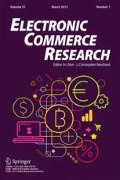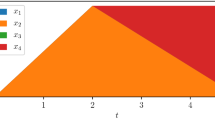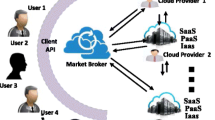Abstract
Scheduling becomes key in dynamic and heterogeneous utility computing settings. Market-based scheduling offers to increase efficiency of the resource allocation and provides incentives to offer computer resources and services. Current market mechanisms, however, are inefficient and computationally intractable in large-scale settings.
The contribution of this paper is the proposal as well as analytical and numerical evaluation of GreedEx, an exchange for clearing utility computing markets, based on a greedy heuristic, that does achieve a distinct trade-off: GreedEx obtains fast and near-optimal resource allocations while generating prices that are truthful on the demand-side and approximately truthful on the supply-side.
Similar content being viewed by others
References
Rappa, M. A. (2004). The utility business model and the future of computing services. IBM Systems Journal, 43(1), 32–42.
Carr, N. G. (2003). IT doesn’t matter. Harvard Business Review, 811(5), 41–53.
Sun Microsystems (2007). http://www.sun.com/service/sungrid/overview.jsp, visited March 2, 2007.
Amazon.com (2007). http://www.amazon.com, visited March 2, 2007.
Waldspurger, C., Hogg, T., Huberman, B. A., Kephart, J. O., & Stornetta, W. S. (1992). Spawn: a distributed computational economy. IEEE Transactions on Software Engineering, 18(2), 103–117.
Chun, B., & Culler, D. E. (1999). Market-based proportional resource sharing for clusters. Millenium Project Research Report.
Regev, O., & Nisan, N. (1998). The POPCORN market – an online market for computational resources. In: Proceedings of the 1 st international conference on information and computation economies, New York, USA, pp. 148–157.
Foster, I. (2005). Globus toolkit version 4: software for service-oriented systems. In: Proceedings of the IFIP international conference on network and parallel computing, Beijing, China, pp. 2–13.
Schnizler, B., Neumann, D., Veit, D., & Weinhardt, C. (2008). Trading grid services – a multi-attribute combinatorial approach. European Journal of Operational Research, 187(3), 943–961.
AuYoung, A., Chun, B. N., Snoeren, A. C., & Vahdat, A. (2004). Resource allocation in federated distributed computing infrastructures. In: Proceedings of the 1 st workshop on operating system and architectural support for the on-demand IT infrastructure, Boston, MA, USA.
Parkes, D. C., Kalagnanam, J., & Eso, M. (2001). Achieving budget-balance with Vickrey-based payment schemes in combinatorial exchanges. IBM Research Report RC 22218 W0110-065.
Bapna, R., Das, S., Garfinkel, R., & Stallaert, J. (2008). A market design for grid computing. INFORMS Journal of Computing, 20(1), 100–111.
Lehmann, D., O’Callaghan, L. I., & Shoham, Y. (2002). Truth revelation in approximately efficient combinatorial auctions. Journal of the ACM, 49(5), 577–602.
Mu’alem, A., & Nisan, N. (2002). Truthful approximation mechanisms for restricted combinatorial auctions. In: Proceedings of the 18 th national conference on artificial intelligence (AAAI-02), Edmonton, Alberta, Canada.
Stößer, J., Neumann, D., & Anandasivam, A. (2007). A truthful heuristic for efficient scheduling in network-centric grid OS. In: Proceedings of the 15 th European conference on information systems (ECIS), St. Gallen, Switzerland.
Degermark, M., Kohler, T., Pink, S., & Schelen, O. (1997). Advance reservations for predictive service in the Internet. ACM/Springer Verlag Journal on Multimedia Systems, 5(3), 177–186.
Smith, W., Foster, I., & Taylor, V. (1998). Predicting application run times using historical information. In: Proceedings of the IPPS/SPDP 1998 workshop on job scheduling strategies for parallel processing, Orlando, FL, USA.
MacKie-Mason, J. K., & Wellman, M. P. (2006). Automated markets and trading agents. In L. Tesfatsion & K. L. Judd (Eds.), Handbook of computational economics, vol. 2: Agent-based computational economics. Amsterdam: North-Holland.
Neumann, D., Lamparter, S., & Schnizler, B. (2006). Automated bidding for trading grid services. In: Proceedings of the 14 th European conference on information systems (ECIS), Gothenburg, Sweden.
Martello, S., & Toth, P. (1990). Knapsack problems. Chichester: Wiley.
Böttcher, J., Drexl, A., Kolisch, R., & Salewski, F. (1999). Project scheduling under partially renewable resource constraints. Management Science, 45(4), 543–559.
Feitelson, D. G. (2002). Workload modeling for performance evaluation. In Lecture notes in computer science : Vol. 2459. Performance evaluation of complex systems: techniques and tools (pp. 114–141). Berlin: Springer.
Sandholm, T., Suri, S., Gilpin, A., & Levine, D. (2001). CABOB: a fast optimal algorithm for combinatorial auctions. In: Proceedings of the 17 th international joint conference on artificial intelligence, Seattle, WA, USA.
Author information
Authors and Affiliations
Corresponding author
Rights and permissions
About this article
Cite this article
Stößer, J., Neumann, D. GreedEx—a scalable clearing mechanism for utility computing. Electron Commer Res 8, 235–253 (2008). https://doi.org/10.1007/s10660-008-9023-z
Published:
Issue Date:
DOI: https://doi.org/10.1007/s10660-008-9023-z




